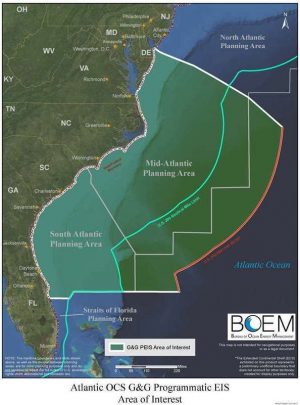
OCEAN CITY — U.S. Senator Chris Van Hollen (D-Md.) grilled Department of the Interior Secretary Ryan Zinke on why Florida has been exempted from the proposed offshore drilling for oil and gas and the biggest takeaway is Maryland could be exempted from the plan by default.
In January, the Trump administration announced a plan to open roughly 90 percent of the nation’s coastline to potentially dangerous offshore drilling and exploration. Closer to home, the federal Bureau of Ocean Energy Management (BOEM) proposed to conduct three sales of offshore oil and gas leases off the coast of Ocean City to private sector interests beginning in 2020.
The latest presidential executive order began anew the long-standing battle by coastal communities, state leaders and environmental advocates against potentially dangerous offshore drilling and exploration. In 2014, the Obama administration considered opening as many as three million acres off the mid-Atlantic coast for offshore drilling, but eventually reversed that decision under mounting pressure from coastal communities, local, state and federal officials and environmental groups.
Shortly after the Trump administration announced it was reopening certain areas off the Atlantic coast for offshore oil and gas exploration and drilling, Zinke announced the state of Florida was exempt from the plan for a variety of reasons, not the least of which was that state’s value as a beach vacation destination.
During a Senate subcommittee meeting on Tuesday, Van Hollen pressed Zinke on why the same consideration wasn’t being given to other coastal states with vibrant coastal economies. Maryland, with Ocean City and Assateague, certainly seems to fit the bill.
“Now, a little more controversial issue,” he said. “This has to do with the Jan. 4 announcement where you set out draft regulations to open the Atlantic Coast to oil and gas drilling, including my state of Maryland. Within a very short time, I think it was five days later, you tweeted out that you were taking Florida off the table for offshore oil and gas.”
Zinke explained Florida was informally removed from the plan for offshore drilling for oil and gas, but formally remained in the proposal essentially because of appearances and fairness. Van Hollen continued to grill Zinke on the protections for Florida, formal or informal.
“I’m sure you can understand why states like Maryland had their eyebrows go up with that,” he said. “It sounded very arbitrary and capricious. So, my first question is does that still stand? Is Florida off?”
Zinke scrambled with his explanation of why Florida was taken out of the proposal while other coastal states with vibrant tourism economies, including Maryland, were left in.
“What I’d like to get is a commitment to put Maryland in the same category,” he said. “Because I saw your testimony and you said there was different criteria and Florida was different for three reasons. For one, every member on both sides of the aisle wrote you a letter saying they are opposed to it. So, my question is, given that we meet those criteria, can you tell me today that we will be treated the same as Florida?”
Zinke made no such promises, but did tell Van Hollen that Maryland would likely be exempt by default because of the apparent lack of resources off the state’s coast, an admission that should come as music to the ears of state lawmakers, representatives from various coastal communities and environmental advocacy groups that have been battling offshore drilling in Maryland in recent years.
“The good news is this,” he said. “There are no known resources off the coast of Maryland. Number two is, the president has ensured that we take the community into consideration and the views of this body, the representatives. Three is that there is no infrastructure off the coast and four is that state waters matter.”
Zinke told Van Hollen the state of Maryland could be off the table by default because of a lack of known resources and infrastructure to support offshore drilling. He also alluded to a possible legislation remedy for Maryland to prevent offshore exploration and drilling infrastructure to be hauled through state waters.
“So, you would have to actually bring something offshore through state waters and if the state decides to say no?” he said. “Since you have no resources and you have no infrastructure, I think you’re going to be very happy with our planning process as we go through. We should release the first draft in the fall.”
Nonetheless, despite Zinke’s assurances, Van Hollen continued to press the Secretary of the Interior for the same blanket protections he afforded Florida in January.
“Well, I just hope that we could put this on a hyper speed like you did in Florida,” he said. “I mean, you have to admit it, it looked very political with you meeting with the governor and making that political announcement by tweet, and I just hope that Maryland and other states that meet those criteria get the same considerations.”

